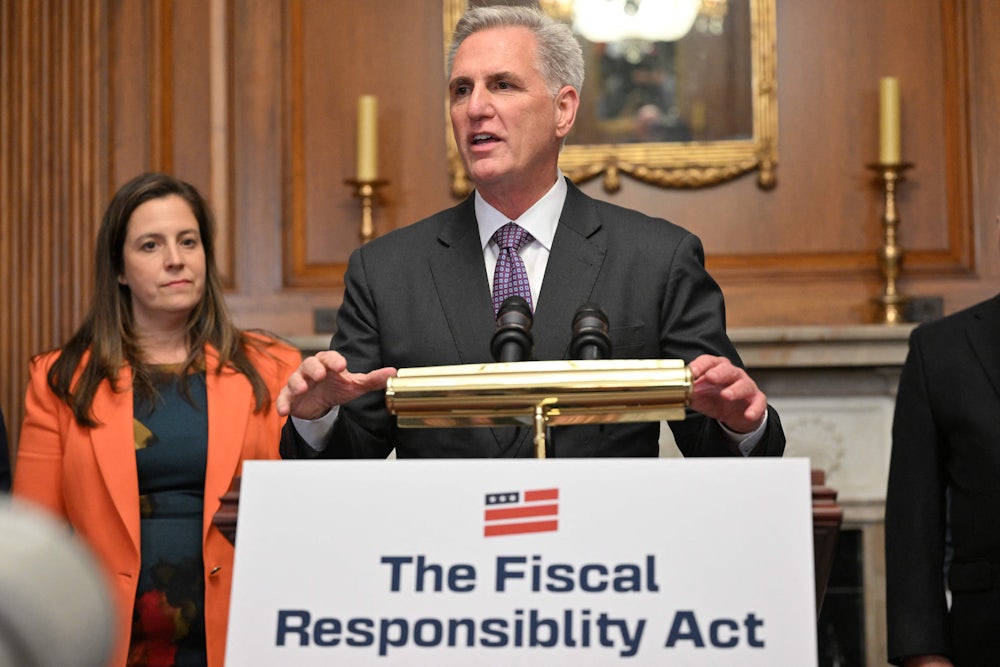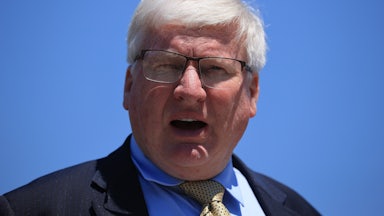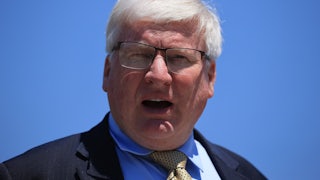House Speaker Kevin McCarthy bears a distinct chip on his shoulder, often suggesting that his political capabilities have been minimized by the media and his opponents. After suffering 15 rounds of votes to earn his gavel, his brief tenure has been characterized by a dogged persistence when pursuing his political goals. But the House passing the debt ceiling deal he and President Joe Biden crafted strengthened his position, his supporters say, even as some within his own party have threatened to move to unseat him.
The debt ceiling bill overwhelmingly passed the House on a bipartisan basis Wednesday night, with a 314–117 vote, earning support from 149 Republicans and 165 Democrats. Conservative critics may argue that more Democrats than Republicans supporting the bill shows it was a concession to Biden and congressional Democrats, but McCarthy has maintained a relatively firm grip on his conference throughout a trying process. And the speaker achieved the key “majority of the majority” in the vote—that is, most of the Republican conference supported it.
In a press conference Wednesday evening, McCarthy enjoyed a rhetorical victory lap. He chided the reporters in the room, recalling how they would mob him after the various speaker votes in January. “Every question you gave me: ‘What could we survive, what could we even do?’ I told you then, it’s not how you start, it’s how you finish,” McCarthy said.
The speaker cast his seemingly inexhaustible persistence as proof of his strength as a leader. “My last statement, to everyone in America: I will never give up on you,” McCarthy said. The implicit message: Don’t give up on him, either.
Republicans hold a mere four-seat majority in the House after a relatively disappointing showing in the recent midterm elections. Critics doubted that McCarthy would be able to hold his conference in line, particularly in light of his arduous trek to the speakership and the promises he made to the more conservative factions of the party. But rather than causing him to lose respect from many of his members, the multitude of speaker votes in early January may have instead earned him goodwill from conservatives who have felt marginalized by previous party leaders.
“McCarthy has exceeded whatever conceivable expectations people might have had,” said Liam Donovan, a Republican strategist. “There’s no question that he has enhanced his credibility. He has proved his mettle to the president, to congressional Democrats, and to the people in his conference who matter at the end of the day.”
McCarthy’s hand was strengthened in April, when House Republicans narrowly passed their own bill lifting the debt ceiling, which included significant spending cuts and rollbacks of major Democratic priorities. After months of insisting that Democrats would not negotiate over the debt ceiling, arguing that it should be lifted separate from any budget-related discussions, the Biden administration engaged with House Republicans this month. House GOPers believe that Biden and congressional Democrats have consistently underestimated them. Who better to serve as their avatar than the man who has seen himself as the underdog for the entirety of his political career?
“People have been underestimating Kevin McCarthy for quite a while. And I think they’re done underestimating him after this,” said Senator Kevin Cramer, who served with McCarthy in the House and remains a friend of the speaker. “He’s savvy. He knows his conference really well. He knows the institutions really well.”
There was some uncertainty around the passage of the “rule” for the measure, which determined how it would be debated on the House floor. Typically, rules pass on party lines, with the majority party voting for a rule even if they intend to vote against the bill itself. But with 29 Republicans defecting on the rule vote, McCarthy needed Democratic support to get it to the finish line. Ultimately, 52 Democrats supported it. Many conservatives have complained about the deal, arguing that it gave too many concessions and suggesting that Biden had outplayed McCarthy.
Still, although some Republicans have floated triggering a no-confidence vote on McCarthy, which would require only one member filing a “motion to vacate” the speaker’s chair, such a move would be unlikely to garner majority support in the Republican conference. Representative Dan Bishop, among McCarthy’s loudest critics, has said that it is “inescapable,” but, he added, it depends on whether members “have the courage.” That more Democrats voted for the bill than Republicans may spur McCarthy’s right-wing critics to action.
But Donovan, the Republican strategist, argued that the vote’s partisan breakdown doesn’t change anything. “It just means [Democrats] will refuse to give him any credit and [the Freedom Caucus] will have more grist for the outrage mill,” he told me after the vote on the deal.
McCarthy himself has been nonchalant about the possibility of such a motion to vacate. “Everybody has the ability to do what they want. But if you think I’m going to wake up in the morning and ever be worried about that? Doesn’t bother me,” McCarthy breezily told reporters on Wednesday afternoon. “If someone thinks they’re right, they have the right to do it. Call the motion.”
“Kevin McCarthy’s stock is still trading as high today as it has in the last five months,” Representative Dusty Johnson told CBS News. “A motion to vacate is simply not in play.” Even one of the loudest critics of the deal, Representative Ralph Norman, told reporters after a lengthy GOP conference meeting Tuesday evening that he did not believe McCarthy’s speakership was at risk. “Good people can disagree,” Norman said.
Moreover, it’s unclear whether Democrats would support this move, which would be critical to its success or failure. “We’ll cross that bridge when we get to it, and there’s been no discussion over the last several days in any of the meetings that we’ve had as it relates to any hypothetical motion to vacate the chair,” House Minority Leader Hakeem Jeffries told reporters on Wednesday. Without a majority of members of either party supporting a move to unseat McCarthy, the threat has little substance. (Asked what would happen if Democrats bailed McCarthy out in a vote of no confidence, GOP Representative Ken Buck replied: “It’s like a date with a eunuch.”)
Representative Scott Peters, a moderate Democrat, told me that he believed McCarthy is “often underestimated.”
“I imagine he will survive,” he said. “I just hope we don’t have to devolve into another 15-vote battle over the speakership.” Peters added that he had not heard Democrats discussing a motion to vacate, explaining: “It would depend on the ‘why.’ Someone would have to explain to me what the strategy is for that. I don’t want the whole [House] to be in disarray.”
McCarthy has long prized his ability to build and maintain relationships with his members, making those connections the locus of his power. The 15 rounds of speaker votes, and the various concessions he made to obtain the gavel, may have strengthened his sway with conservatives rather than weakened it. Perhaps McCarthy did not sell the farm so much as hire it out to contractors.
“To put together a coalition that could function in this environment, McCarthy really had no choice but to deal these guys in, to give them power, and with that power came responsibility and skin in the game,” Donovan said. For example, McCarthy ensured that the powerful Rules Committee included three conservatives, including Representative Thomas Massie, who has often been a thorn in the side of Republican leaders. But Massie was a McCarthy ally in the debt ceiling fight: He voted to advance the legislation in the Rules Committee, ensuring it made it to the House floor, and supported the final product.
Representative David Schweikert, a more moderate Republican, hypothesized that the multiple speaker votes helped frustrated members “get it out of their system” and “come to a conclusion of how perilous such a tiny majority is.” “When you go through stressors, it focuses the mind,” Schweikert said.
For their part, Democrats have dismissed the idea that they misjudged McCarthy’s ability to keep his conference in line. “Hey, look at the results. Number one, we avoided default, our number one goal, which we’ve been talking about from day one. Number two, it is a far, far cry from where the Republicans started out,” Senate Majority Leader Chuck Schumer told reporters when asked whether he underestimated McCarthy.
One Democratic representative, speaking on condition of anonymity, told me that “Biden is just used to old-school gentlemanly negotiations and wasn’t quite prepared for the alleyway knife fight.” The Democrat added: “But now [Republicans] are super divided, and Democrats are pretty unified today.”
McCarthy kept the majority of his conference together but still required Democrats to get across the finish line; however, any debt ceiling deal that was acceptable to the Democratic White House and Senate was always going to need Democratic votes to pass in the House to counter frustrated conservatives.
The passage of the debt ceiling deal means McCarthy has lived to fight another deal as speaker, without allowing the country to tumble into catastrophic default. If he continues to strengthen his grip on power, it will be due in no small part to his ability to maintain the relationships with his members that he has so carefully tended. Schweikert called McCarthy “a savant at human relationships.” He cast backward to McCarthy’s time in the California state house, when he rose to the position of minority leader in under a year, and his prodigious fundraising talents as a member of Congress.
“If you take a step backwards, this guy ascended to leadership very quickly when he got [to Congress],” Schweikert said. “Look at his California history; he ascended very quickly there. If you actually look at the facts, look at the money he raised off cycle. If you underestimate him, you just weren’t paying attention.”






